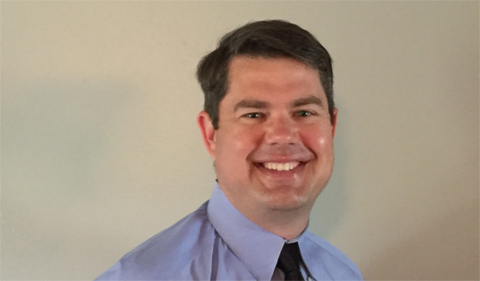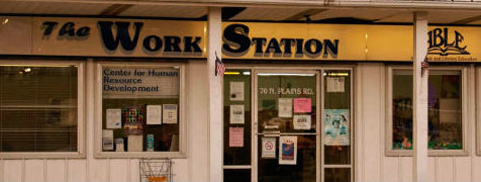Alum Scott Zielinski ’00 talked to Ohio University students about his work helping people released from prison—and getting the skills he needed for his career.
Zielinski graduated in 2000 with a bachelor’s degree in Sociology and a certificate in Criminology from the College of Arts & Sciences (before the current Sociology-Criminology track was implemented).
He talked to Dr. Nicole Kaufman‘s Punishment and Society course (SOC 3660) on Oct. 5 about his career at The Work Station in Athens County. Zielinski says he always wanted to help people and has been working in social services since the summer of 2000.
The Work Station, where Zielinski supervises a re-entry program, is dedicated to “providing Athens County residents and employers with no-cost employment, education, and training services.” Services include GED preparation, resume-building assistance, displaying and sharing job openings, matching resumes to employers, providing interview spaces, and organizing job fairs, all for free. The reentry program helps people get back on their feet and into the workforce after being released from prison.
‘Right After Conviction Is When People Are Receptive to Change’
Reentry programs begin roughly two weeks before an inmate is scheduled to be released, Zielinski says. Prisoners participate in a video conference with a representative from The Work Station to establish a plan and a place to go when they are released.
The station provides “welcome home” kits that include some essential clothes and toiletries. The station also gives the former inmate an ally and a resource to stay in contact with while transitioning back into mainstream society.
“Right after conviction … is the time is when people are most receptive to try to change their ways and do the right thing from here on out,” says Zielinski. “There’s a lot you can accomplish in those first couple of days…. We don’t care what led to the point where they got the felony. We’re not making any kind of judgment call on them.”
Zielinski has lots of experience with the difficulties ex-convicts can face when looking for employment.
“Ex-offenders don’t always get to benefit from an increased demand for new-hire workers when the economy improves,” he says. “Their record often keeps them from finding employment even when employers are faced with a shortage of employees.” Many employers actually use felonies on a record to weed out a large number of applications. This practice, however, is being combated. Ohio recently passed a law that prohibits state-level public employers from asking about criminal records up front. This is to allow those with felonies and misdemeanors on their records an equal chance to get their applications seen and considered.
“What we try to do every day is level the playing field,” Zielinski says, “and give people a little bit of assistance to get to the point where they can move forward in life.”
The Work Station doesn’t simply give handouts, though. Hardworking people get as much out of their services as they put in.
“We can’t do things for them, and I don’t think we should.… You can study at our place and get your GED, but we can’t take the test for you. We can help you pay for that welding class, but you’ve got to go to class and study yourself.”
An Internship: ‘That’s How I Got My First Job’
Zielinski used internships and the Career Leadership and Development Center at Ohio University to get ready for his career.
“The skills that you need, no matter what your field is, to find and advance in a job are a skill set. It’s something you have to learn and practice…. For the rest of your life, you’re going to be using those skills trying to get a better job,” he says.
Going to the CLDC isn’t the only thing Zielinski did to prepare to enter the workforce.
“Before I left OHIO, I started reaching out to some of the larger social service agencies to intern, to get work experience, and basically to know people [in the field]. That’s how I got my job,” he says. “There’s a fairly high turnover in the world of frontline social service. By interning and being hands-on, if you still want to do that type of work afterward, you’re demonstrating to a future employer that you’ve already had experience and still want to do this.”
Zielinski also advises being willing to take any job in the field in order to get your foot in the door—and getting hands-on experience in entry level jobs before expecting to advance.
Before landing his supervisor role, Zielinski served as a reentry coordinator and even worked in DNA swabbing. He believes getting a wide array of experience on the front line is the ideal way to ensure competence in a managerial position.
“Ideally, you would spend a lot of time hands-on, seeing how it all works, and then afterward, applying all of that knowledge to helping people do their jobs,” he says.
Speakers like Zielinski provide invaluable interactions for students still in the process of choosing a field of work. “They need to be thinking about the labor market opportunities that they’re going to be facing, and what appeals to them,” Kaufman says. “Seeing the experience of someone who has been through the same institution and some of the same professors, and what they did with that degree, is valuable.”





















Comments